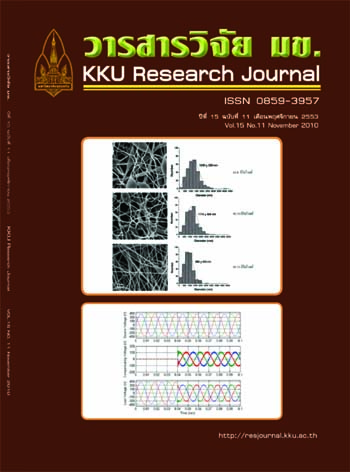Effects of Vitamin C in diet on growth, feed efficiency and survival rate of Pangasius bocourti sauvage, 1880 (Thai)
Main Article Content
Abstract
This study was conducted to investigate the effects of vitamin C supplementation in the diet on growth, feed efficiency and survival rate of Pangasius bocourti Sauvage. The experiment was laid in a completely randomized design. There were 3 replicates for each treatment. A glass aquarium (dimension 45 x 90 x 45 cm), filled with 150 liters of water, was used as the experimental unit. Experimental fish with an initial mean weight of about 1.16 g,
were stocked at a stocking density of 20 fish/aquarium. Formulated diets contained 30% protein and 280 kcal/100 g digestible energy, and were supplemented with ethyl cellulose coated vitamin C at four levels (treatments); 0%, 0.5%, 1% and 2%. Fish were fed to satiation twice daily at 09:00 a.m. and 15:00 p.m. for an 8-week rearing period. The results show that the fish receiving diet containing 1% of vitamin C supplementation had the highest growth. There were significant differences in average weight gain, average length gain and specific growth rate among fish groups (p < 0.05). Growth parameters, average weight gain, average length gain and specific growth rate were 13.62±0.52 g/fish, 6.85±0.08 cm/fish and 4.35±0.02 %/day, respectively. Survival rate for all dietary treatments was 100 %. Supplementation of Vitamin C at different levels showed a significant effect on feed conversion ratio and feed intake among dietary treatments (p<0.05). The lowest feed conversion ratio (1.33±0.03), feed intake (323.18±2.48 mg/day), protein intake (96.73±0.74 mg/day), and energy intake (0.89±0.01 Kcal/day) were found in the fish receiving a diet supplemented with 1% of vitamin C.


